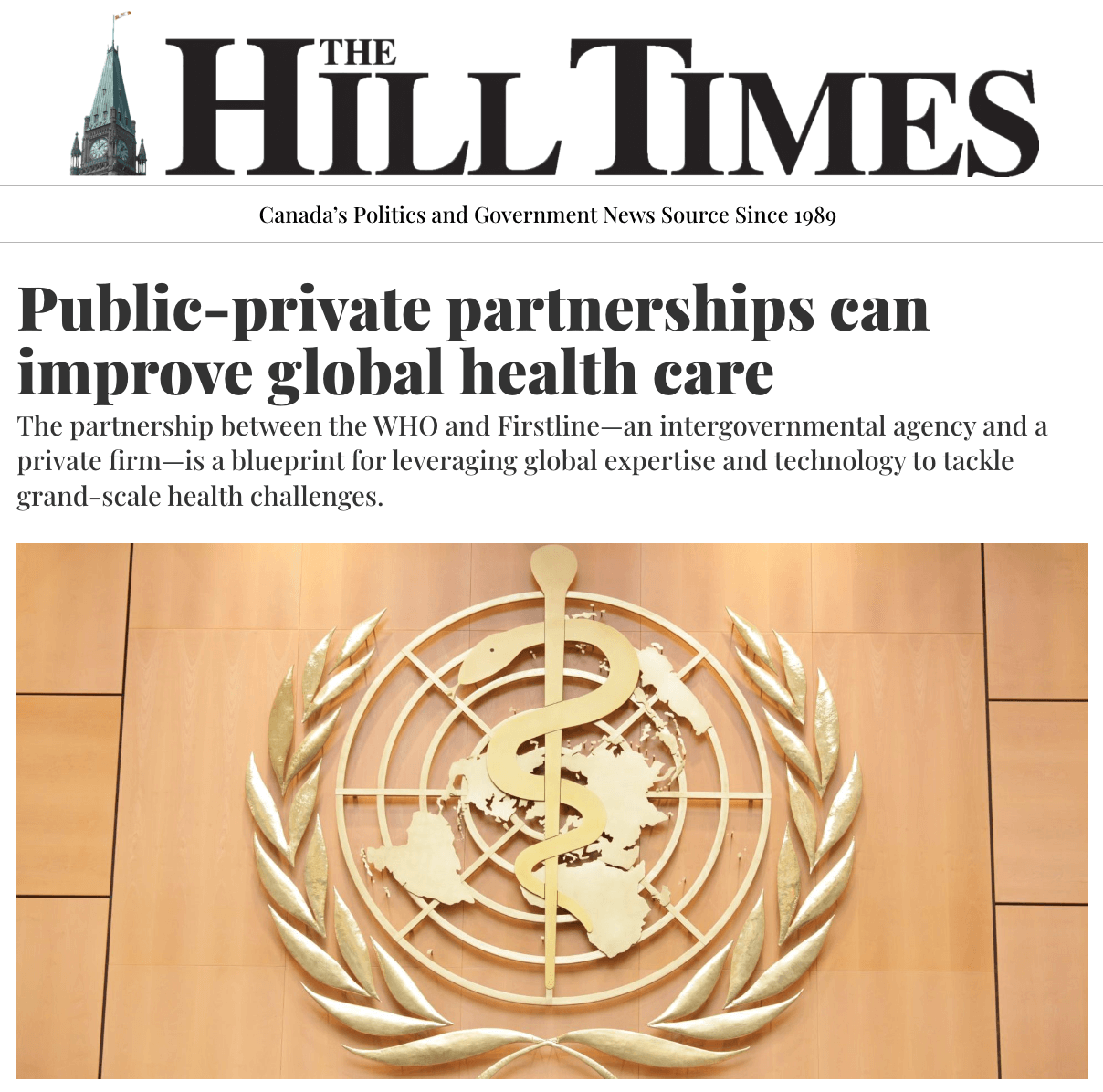This is an opinion that first appeared in the The Hill Times
The partnership between the WHO and Firstline — an intergovernmental agency and a private firm — is a blueprint for leveraging global expertise and technology to tackle grand-scale health challenges.
In the complex world of global health, antimicrobial resistance remains a formidable and persistent foe. In 2019 it accounted for 1.2 million deaths globally, and that number could rise to 10 million by 2050, making it the world’s worst health threat. In Canada, a quarter of bacterial infections are already resistant to at least one medicine. In the United States, antimicrobial resistance (AMR) costs US$55-billion in health-care costs and lost productivity annually.
Urinary tract infections, sepsis, sexually transmitted diseases, malaria and tuberculosis are some of the illnesses that have already become more challenging to treat. Childbirth and routine surgeries such as C-sections have become riskier as the medicines that we have relied on for decades lose their effectiveness. And there’s no cavalry on the way in the form of new drugs. As the World Health Organization bluntly puts it: “The clinical pipeline of new antimicrobials is dry.”
The fight against AMR is a victim of what’s known in medical circles as the “implementation gap.” Essentially, it is the difference between what scientific evidence and clinical experts say health-care systems should do, and what actually happens on the ground. It’s a gap we urgently need to close, and new public-private partnerships could help.
The media tends to call drug-resistant pathogens “superbugs,” as though they have acquired incredible new powers. But there’s no mystery behind the causes of this resistance. Antimicrobials are overprescribed and often used inappropriately, giving the bacteria, viruses, and fungi they target a chance to adapt. And once they do, they can spread rapidly.
The implementation gap is a longstanding problem—almost 20 years ago researchers were calling for “more effective ways of promoting the uptake of evidence-based interventions”—and it affects every part of health care. But it is particularly problematic when it comes to drug resistance, because poor practices anywhere can create problems everywhere.
The WHO is now moving with urgency on the matter. Its efforts include developing and publishing a gold-standard guide on antimicrobial prescribing called the Aware Antibiotic Book. This resource provides evidence-based recommendations for appropriate antimicrobial use, and highlights the importance of preserving the existing arsenal of life-saving drugs.
The WHO has also thought deeply about how the knowledge can be communicated to clinicians and implemented at the clinical level.
At Firstline, a health technology company, we have worked with the WHO to translate its research into the actionable guidance essential to clinicians and to distribute it universally. Doctors and nurses in every country now have access to the WHO’s guidance through a free app and website. This gives vital help at the bedside to prescribe the right drugs in the correct way for many of the most common infections.
We know this works. Organizations using the technology have seen impressive reductions in inappropriate antimicrobial prescriptions—one hospital cut its use by 25 per cent within a year. It is an innovation that bridges the gap between knowledge and practice, enabling a higher standard of care everywhere.
The partnership between the WHO and Firstline—an intergovernmental agency and a private company — is a blueprint for leveraging global expertise and technology to tackle grand-scale health challenges. It is an example of meaningful action to address a humanity-scale problem that cannot possibly be solved by any single actor—even the world’s apex healthcare authority.
As we grapple with the escalating threat of antimicrobial resistance, this model shows us the path to a more resilient, responsive, and effective global health-care system.
In the face of this global health challenge, policymakers must not merely dip a toe into collaborations with mission-driven private organizations. They must dive in. The WHO and Firstline partnership demonstrates that such collaborations not only work, but also are integral to closing the implementation gap. These are not optional relationships anymore, but essential alliances that could help preserve the integrity of health-care systems and protect human lives.
The consequences of inaction on antimicrobial resistance are grave, and could include millions of lives lost, skyrocketing health-care costs, and our current arsenal of life-saving drugs becoming obsolete. It’s the grandest of challenges, one that demands urgent, collaborative and innovative solutions. We can no longer afford to act in silos. It’s time to foster partnerships, embrace technology and fortify our defences against this rapidly spreading threat. Many lives depend on it.
World Health Organization on Firstline
- About the WHO-Firstline partnership
- Download and use WHO guidance
- Moving WHO guidance on Antibiotics into clinical practice
Dr Tedros Adhanom Ghebreyesus, Director General WHO, address to Minister Champagne of ISED announcing AWaRe Antibiotic Book launch.

